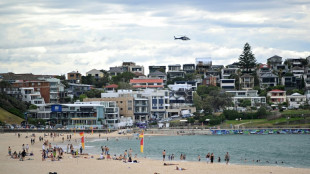UN mobilises response after Sudan landslide kills hundreds
The United Nations said Tuesday it is working to respond to a devastating landslide in Sudan's Darfur region that buried an entire mountain village, killing as many as 1,000 people.
Heavy rain triggered the disaster on Sunday, flattening the village of Tarasin in the remote Jebel Marra range, the rebel Sudan Liberation Movement/Army (SLM) faction which controls the area said in a statement, adding that there was only one survivor.
"The United Nations and our humanitarian partners are mobilising to provide support to the affected population," UN humanitarian coordinator in Sudan Luca Renda said in a statement.
Citing sources on the ground, Renda said the death toll from the landslide was believed to be between 300 and 1,000.
The SLM faction led by Abdulwahid al-Nur had earlier estimated the death toll at more than 1,000 people.
"Initial information indicates the death of all village residents, estimated at more than 1,000 individuals, with only one survivor," the group said, calling the landslide "massive and devastating".
It appealed to the UN and other aid organisations for help in recovering the dead from beneath the mud and debris.
"Masses of mud fell onto the village," Nur told AFP via a messaging app.
"Our humanitarian teams and local residents are trying to retrieve the bodies, but the scale of the disaster is far greater than the resources available to us," he said.
Images the SLM published on its website appeared to show vast swathes of the mountainside sheared away, with the village below buried under thick mud and uprooted trees.
- Buried beneath the mud -
The African Union called on "all Sudanese stakeholders to silence the guns and unite in facilitating the swift and effective delivery of emergency humanitarian assistance".
In a telegram published by the Vatican, Pope Leo XIV said he was "deeply saddened to learn of the devastation caused by the landslide", praising "the civil authorities and emergency personnel in their ongoing relief efforts".
The SLM controls parts of the Jebel Marra range and has mostly stayed out of more than two years of war between the regular army and the paramilitary Rapid Support Forces (RSF).
But hundreds of thousands of people have fled into SLM-held territory to escape the violence.
Jebel Marra is a rugged volcanic range stretching about 160 kilometres (100 miles) southwest from North Darfur's besieged state capital El-Fasher, which the RSF is pushing to capture after besieging it for more than a year.
The area, known for citrus production, is prone to landslides, particularly during the rainy season which peaks in August. A 2018 landslide in nearby Toukoli killed at least 20 people.
Since April 2023, Sudan has been ravaged by a war that erupted from a power struggle between army chief Abdel Fattah al-Burhan and his former deputy, RSF commander Mohamed Hamdan Daglo.
The war has killed tens of thousands of people and driven more than 14 million from their homes, according to UN figures.
- 'Painful disaster' -
The rivals have both responded to Sunday's disaster.
Burhan's Transitional Sovereignty Council, which heads the army-aligned government based in Port Sudan on the Red Sea coast, pledged to mobilise all available resources to support those affected by what it described as a "painful disaster".
The rival government based in South Darfur state capital Nyala also weighed in on the tragedy.
Mohamed Hassan al-Taayshi, the prime minister recently sworn in by RSF commander Daglo expressed deep sorrow, saying he had spoken directly with SLM leader Nur to assess needs on the ground.
"The lives and safety of Sudanese citizens are above any political or military considerations," he added.
Much of Darfur -- including the area where the landslide occurred -- remains inaccessible to international aid organisations due to ongoing fighting, severely limiting the delivery of emergency relief.
The disaster also comes during Sudan's rainy season, which often renders mountain roads impassable.
In Sudan's main war zones like Darfur, infrastructure was already fragile after more than two years of fighting.
In a series of offensives earlier this year, Burhan's forces retook central Sudan including the capital Khartoum, leaving the RSF in control of most of Darfur and parts of Kordofan in the south.
A.Vogel--BVZ




